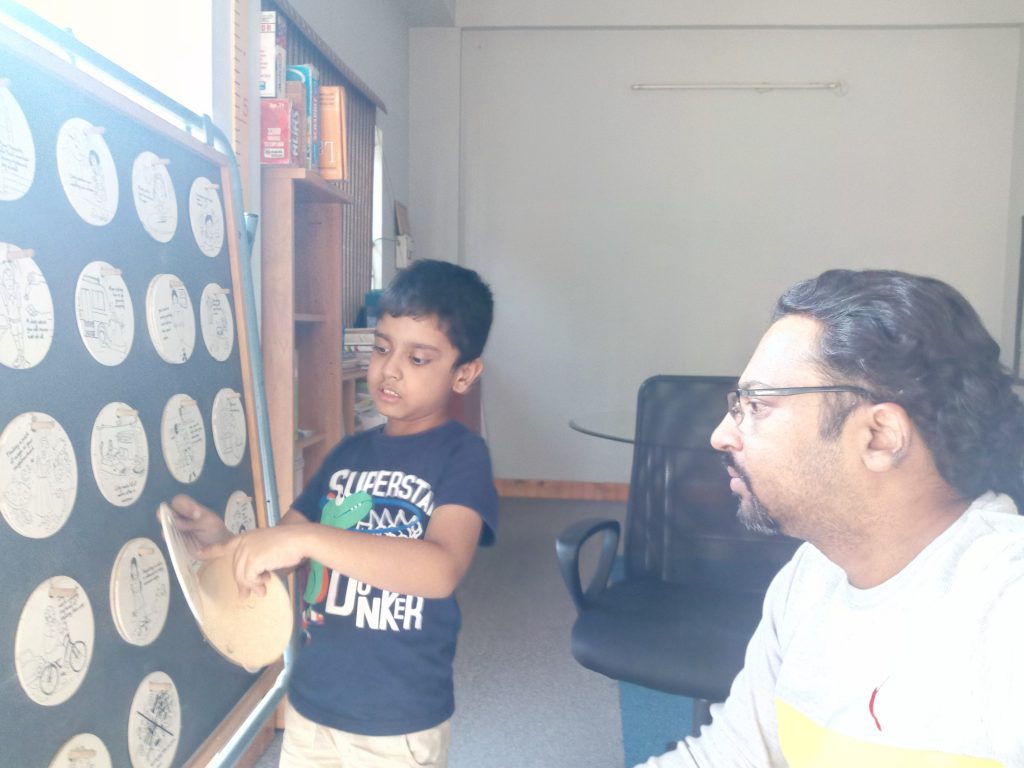Introduction
When people ask me what’s the value of learning Mathematics if you are not going to apply in your job, I say Mathematics is all around you. If you understand Mathematics you can appreciate how nature works, how the celestial bodies work, and how everything we have created so far works. Understanding Mathematics helps you see the beauty of everything around you in its deepest layers.
Mathematics is something we learn from childhood. However, why is it that we don’t learn or appreciate it after we are done with it from our exams perspective? Even children today try to look at Mathematics as yet another subject where you can score a lot of marks.
In the fourth part of the NumberNagar® Dialogue Series, I talk to Raghu about various aspects of learning to like Mathematics. Raghu is a Co-founder of NumberNagar®, a mathematician, an astronomer, and a lifelong learner. Raghu looks at Mathematics as the “language of the universe”. Let’s see what he has to say about how children today can get command in Mathematics and can love it for the rest of their lives.

Dialogue with Raghu
Nishant: “Please tell me something about yourself and your role in NumberNagar®.”
Raghu: “I am a learning enthusiast. Always learning new things and new ways to better myself. At NumberNagar® I am one of the Co-founders and play the role of President of Academics. This gives me an opportunity to look for new methodologies of learning; researching and integrating new ideas into the teaching and facilitation methods at our learning centres.”
Nishant: “We know you as a person who is well-read and skilled in many areas. What are your main areas of interest?”
Raghu: “My first love is Astronomy. The universe has intrigued me since I was 6 years old. I have trained myself in Mathematics, Education, Psychology, and Magic. Travel and adventure are other interests of mine.”
Nishant: “We know that you are an astronomer. Do you think being interested in Mathematics has helped you in the field of Astronomy?”
Raghu: “It’s the other way round. My love for astronomy pushed me to learn the language of the universe – Mathematics.”
Nishant: “Mathematics is essential to understand about celestial bodies. But, what about the things around us? How much do you think does Mathematics apply, if we want to understand the things around us?”
Raghu: “Like I said before, Mathematics is the language of Nature, the way leaves are arranged on a branch to receive optimal sunlight, or the wild dogs hunting in packs with complete co-ordination, the delicious cooking prowess of our mothers, the decisions we make on a day to day basis. All these involve simple Mathematics that we teach children in their primary and middle schools. According to me, the city in which we live is a purely mathematical construct.”
Nishant: “Were you always interested in Mathematics? When did you find you that you really like Mathematics? Tell me in brief on your journey with learning Mathematics and making it an intrinsic part of your life.”
Raghu: “If I remember correctly, it was in grade 3 or 4. During summer vacation, my cousins and I visited our grandparents in a small village called Kirangooru, near Srirangapatna. My uncle and aunts had a strict academic routine for us to follow during holidays. One of the activities was to solve maths puzzles from a regional magazine. These puzzles were generally magic squares. I remember vividly that it was the easiest thing for me to do, compared to other activities. This was the earliest exposure to Mathematics in my formative years.
Then in grade 7, I was introduced to pi by my favourite teacher – Ms. Champubai. It just blew my mind how the value of pi was arrived at in ancient times and the fact that we have not been able to get the exact value of pi intrigued me immensely.
Then in Grade 12, I was introduced to differentiation. I am still awe-struck about this fascinating branch of Mathematics that can explain almost everything that happens in the universe.
Another thrilling aspect of Mathematics is that it helps you get deeper into the atom (the quantum realm) and understand the behaviour of the particles about whose existence you only know because of their interactions and none of us have actually physically seen them. This feels like knowing the mind of the creator.
I think my interest in Maths was also due to the fact that I found it simple and logical; and it helped me ace my exams with 100% marks.
As a kid, numbers and their operations were simply mind-blowing to my young mind and that transformed into a long-lasting love and passion over time.”
Nishant: “That’s fascinating! You work with and teach children of varied ages. Do you see that many children nowadays are not really keen in learning Mathematics? What are the main reasons?”
Raghu: “I think it’s a notion that as a society we are trying to put it in the minds of the next generation. Mathematics is a simple logical process of understanding the world around you. Kids will love that if it is presented to them in the right way. So it is in the hands of the teacher to make Maths interesting for kids.
At the same time, there will be few who will not be inclined towards logic and sticking to a process, so Maths may not be their choice.”
Nishant: “Do you also think children have a short attention span in the world today when everything can be googled?”
Raghu: “Not at all. If they love something then they do it the whole day. So this lack of attention span seems to me like an escape route the elders are taking to get out of their responsibility of making learning a meaningful experience for children.”
Nishant: “There is a myth that girls are not very good in Mathematics. What do you think about this myth? Can you bust this myth for us?”
Raghu: “Maths is a logical subject and it is independent of gender. Many of my female classmates starting from as early as grade 5 competed with me in academics, and were great at Mathematics. It is another thing that not many girls choose Mathematics in higher education. I have not been able to understand why that is.”
Nishant: “Yes I think there are many girls and women who are making the nation proud. Think about the women scientists in ISRO who are helping with the Mathematics of the most complex nature to launch rockets and to put satellites in the orbit.”
Nishant: “Is there any link between the way Mathematics is taught and children finding it dry or even boring?”
Raghu: “We can’t definitely pinpoint this as the only reason. Now while I was growing up, the environment at home with my Uncle and Aunts was very conducive for learning and thinking. That made Mathematics an integral part of our studies. Teachers added their bit to make it interesting.
It is how the formative years groom your learning experience that decides what gets your attention and what doesn’t. I would say parents have to give the right options for kids during the formative years (0 – 5) years of age.”
Nishant: “How can children be so good in Mathematics that they can say that they have command over it?”
Raghu: “Systematic learning habits. Like it is said readers are leaders, Maths comes with practice. Every day kids should have a dedicated time to learn and explore new ideas. That will keep them active and help get better at anything over time.”
Nishant: “I think if the children are having fun while learning something new, they would like to spend more time learning that concept. What are the ways we can make Mathematics fun?”
Raghu: “If we can highlight these features to the kids when they are learning new concepts then it helps them connect with the subject better and improve their competence.”
Nishant: “How can NumberNagar® help in rekindling the interest in Mathematics in children?”
Raghu: “Mathematics has two distinct features, one – it is very logical and two – it is very obvious in its connections to day to day life.
At NumberNagar® we follow a simple 5C™ methodology that highlights the beauty of Mathematics to every learner at their own time and at their own speed.”
Nishant: “Are there other projects in the pipeline in NumberNagar® which will make children come back to Mathematics over and over again?”
Raghu: “Yes indeed! The R&D team is putting together some interesting learning kits for students of ages 5 – 14 years. Follow us on social media to keep track of the new product launches.”
Nishant: “Thank you Raghu, for bringing out so many important points for getting command in Mathematics and having fun while learning Mathematics. These insights will certainly help children as well as grown-ups alike. How do we reach to you if we have any questions?”
Raghu: “Thank you, Nishant. You can always reach out to us at info@numbernagar.com or call us on +91-63612 02395.”
Conclusion
NumberNagar® provides a unique environment to learn Mathematics in a fun way. Once children get the logic behind solving mathematical problems, they are hooked to it for their life.
Raghu spoke about our 5C™ methodology before. Our 5C™ methodology is based on the belief that a learning cycle is complete when a learner is immersed in the 5Cs of learning – Curiosity, Clarity, Connectivity, Communication, and Competence. It ensures that creativity is inculcated in children, which helps them in various ways throughout their journey.
What do you think? Let us know by adding a comment below and connecting with us using the form below.
I’d recommend you to also read the following articles we published before and are relevant to this important discussion:
- Chai pe charcha – Mathematics for amusement
- Discovering Mathematics all around you
- Doodle your way into Maths
- The Curious Case of the Mathematics behind the Illusions
- The Fascinating Mathematics behind Holograms
Nishant Krishna
Latest posts by Nishant Krishna (see all)
- The Psychology behind forming Lifelong Habits - 13 March 2020
- NumberNagar® Dialogue Series – On Making Mathematics the Way of Your Life - 7 February 2020
- NumberNagar® Dialogue Series – On Getting Command in Mathematics - 24 January 2020
- NumberNagar® Dialogue Series – On Bringing Fluency in Spoken English in Children - 17 January 2020
- NumberNagar Dialogue Series – On Creativity in Children - 10 January 2020

